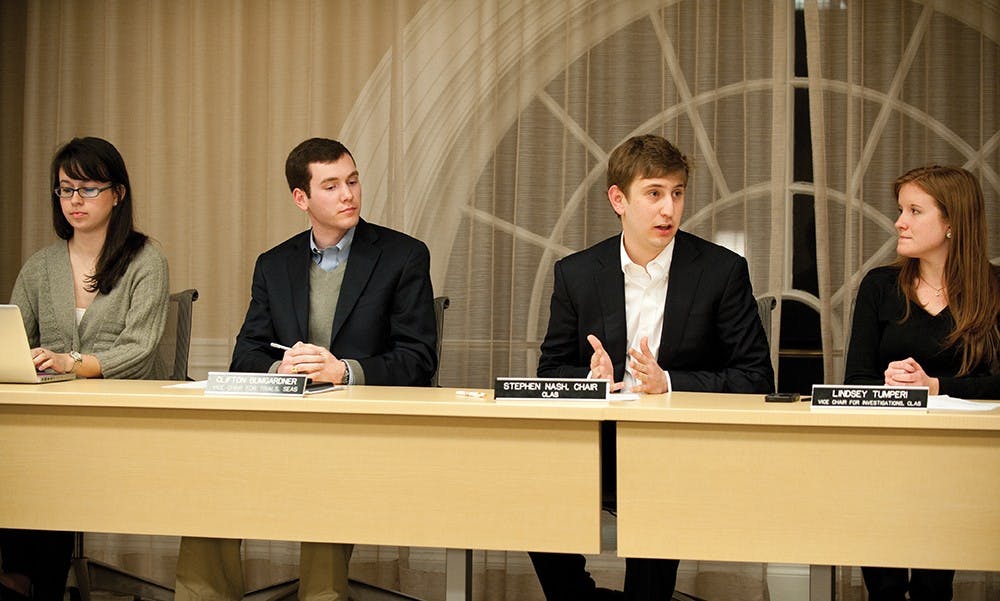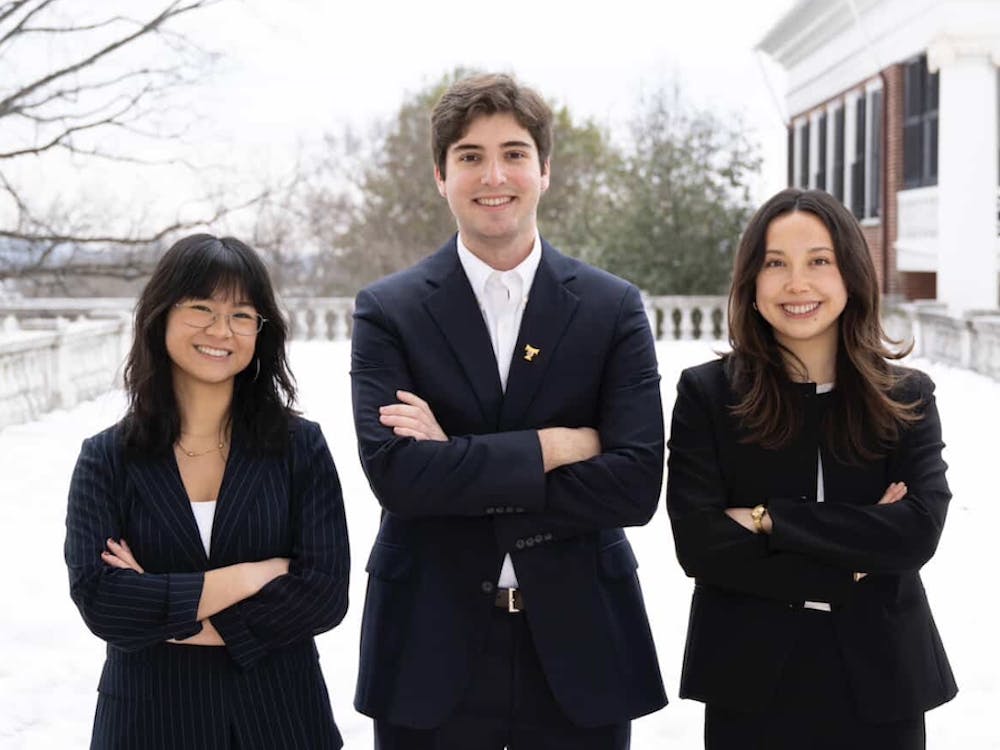The University’s honor system is at a pivotal point in its nearly 175-year history.
As the University has grown in size and diversity, the honor system, which relies on complete student buy-in, has become more and more difficult to administer, and has lost student confidence as a result. Among the top issues the system faces today are random student juries, which plague honor trials by reaching vastly inconsistent verdicts, and reporting rates for honor offenses, which reveal several disturbing issues about student and faculty confidence in honor.
In this second installment of a three-part series on the honor system at the University, we examine its current status. Last week we examined honor’s past.
Student Council President Eric McDaniel, a fourth-year College student, said University students support the “principle of honor,” but the enforcement process of the system had serious flaws.
“In [one] sense, honor is doing well,” McDaniel said. “[But] there are very substantial problems… If we as a community can’t figure out to solve these problems, we will be in trouble.”
Last school year, the Honor Committee, led by then-Chair Stephen Nash, attempted to solve these problems through a massive outreach effort and a reform proposal entitled the Restore the Ideal Act. The act would have eliminated random student juries, replacing them with Committee jurors, and instituted the informed retraction, which allows accused students to admit guilt to an honor offense prior to an investigation and subsequently take two semesters away from the University.
Restore the Ideal failed, taking jury reform off the table for the time being. The student body, however, did approve the so-called Bellamy Proposal, which instituted informed retraction.
Limited reporting and inconsistent juries are significant threats to the honor system — issues the Restore the Ideal Act was attempting to address — said current Honor Committee Chair Evan Behrle, a fourth-year College student. So far, the effects of last year’s efforts by the Committee are unclear. Informed retraction is still in its infancy and students and faculty alike are still calling for jury reform, signaling that there is still work to be done.
Honor Committee Vice-Chair for Trials Conor O’Boyle, a fourth-year College student, said the previous Committee made some progress in strengthening the system, but some problems are just as relevant as ever, especially jury reform.
“I think Stephen [Nash] did as good a job as any chair I’ve ever seen in actually starting a conversation [about honor],” O’Boyle said. “The fact that one head of the proposal passed and one didn’t pretty accurately reflects the fact that one problem was solved but one problem in large part still remains.”
A Crisis of Confidence?
According to a 2012 survey conducted by the Committee, 23 percent of students felt they were afforded no benefits due to the honor system, up 11 percent from 2008 and larger than the highest mark in the past 13 years by about 7 percent. Only 33 percent of 2012 respondents felt they were afforded many benefits due to the system’s presence.
Nash, a 2013 graduate of the College, said the survey showed students generally had a positive view about the concept of the honor system, but there was a substantial gap between that concept and reality.
“[In that survey] we found that honor is not completely broken and is working well in many ways,” Nash said. “On the other hand, we found a disconnect between the idea of honor and the system in practice… It’s not that people are hostile about the system — they still think very highly of it — they’re just losing confidence in its administration and its practical effects day in and day out.”
Nash also said limited faculty buy-in to the system is discouraging. Citing inconsistent honor trials, many professors opt not to report offending students to the Committee and instead decide to deal with violations themselves.
“During my time in the system … I’ve seen a lot of faculty frustration,” O’Boyle said. “It’s really obvious that there are a lot of faculty members that report, go through the system and see really inconsistent verdicts and a long trial process, and choose never to report again, and sometimes even tell newer colleagues never to report.”
With both faculty and students wary about the ability of the honor system to protect and maintain the community of trust, Committee members have worked hard to restore confidence in it. Nash, who said his main focus during his tenure was to bridge the gap between the Committee and the student body, launched a mammoth outreach effort to solve the problem.
“Of students who attended honor educational events, I think they were twice as likely to know more about the system and twice as likely to think positively about the system,” Nash said. “That was a finding that hasn’t been done before and really showed the advantage of engagement.”
Reporting Rates
Low reporting rates create a negative feedback loop with lagging confidence in the honor system. Lack of confidence in the system is has been partially responsible for falling reporting rates in recent years, and the low reporting rates in turn cause individuals to lose faith. Nash also attributed the falling rates in part to faculty dissatisfaction with trials results.
“We used to have about 60 to 80 cases a year, and now we’re down to about 30 to 50 cases a year,” he said. “The problem exists not in that we are having fewer reports, but that faculty who did report had very negative views leaving the honor system and were becoming detractors.”
But Nash insisted reporting rates were not the best measure of the honor system’s success, claiming an ideal honor system would not have any reporting, as everyone would act honorably. He emphasized this was another issue of student confidence.
“We thought [more confidence in the system] would in turn breed more reports, but then less reports, because we thought it would let the students feel more benefits, and the more benefits you feel the less likely, in my opinion, that you’re going to commit an act of lying, cheating or stealing,” Nash said.
Disproportionately high reporting of athletes and minority students, as compared to non-athletes and white students, likely breeds further dissatisfaction. Nash and Behrle said minority students and student athletes in the system are not convicted at disproportionate rates, but both said the reporting issue is still of significant concern.
“Until we figure out why they are reported at a higher rate, it stands as a problem,” McDaniel said. “Those students shouldn’t be unfairly subjected to the process.”
Un-Informed Retraction
The first of the two packaged reforms in the Restore the Ideal Act — the informed retraction — had been discussed by previous Committees, but not in a manner consistent with the ideal of honor, according to Nash.
“No one on the Committee felt informed retraction would solve everything,” he said. “Problems [past Committees] identified were too much focused on the policy of honor instead of the conceptual focus of honor. We thought we needed to reorient it towards a positive ideal. We felt conceptual informed retraction re-emphasized the positive focus on honor.”
Nash said the informed retraction his Committee proposed was meant to encourage honorable behavior, which is why accused students must file before the investigation process rather than using it to hedge risk once they saw the evidence collected.
“The focus should not be on the suspension,” he said. “The focus should be on the student reaffirming their place in the community of trust, doing the right thing and coming back to the University.”
During the outreach campaign last semester, opponents said informed retraction diminished the single sanction, in which any student found guilty of an honor offense is removed from the University. Nash, however, strongly disagrees.
“The single sanction that I believe in, and what I believe is the historic single sanction, is that we should have a community where when someone commits an honor offense, it’s so egregious and so violates those bonds of trust that we cannot think of any other consequence besides asking them to leave our community,” Nash said. “That’s what the single sanction means, not that we should expel anyone who lies cheats or steals.”
Nash compared informed retraction to the decades-old conscientious retraction, which allows students to admit to an honor offense before being suspected by members of the community, and subsequently only face non-Committee determined consequences. Both informed and conscientious retraction, he clarified in an email, allow “certain actions to reaffirm a student’s place in the community of trust, and does not change the single sanction for those who are found guilty of committing an honor offense.”
According to the Committee’s website, six students have taken informed retractions since its implementation last spring.
Jury Reform
To address the issue of inconsistent jury verdicts head on, the second component of the Committee’s proposal was jury reform. Currently, students can opt for an all-Committee jury, a random student jury or a mix of the two. The act would have mandated all-Committee juries for every trial, but the student body rejected the proposal.
Nash said his Committee believed jury reform and informed retraction were important to solve confidence issues in the honor system in tandem. Though informed retraction would encourage honorable behavior, jury reform would allow students to believe in the process.
“We knew it would be politically difficult to sell students on all-Committee juries, but we thought at the end of the day, we have an obligation and a responsibility to put forward the optimal solution,” Nash said. “We truly believed this was the best solution for the honor system.”
Nash opposed jury reform in his earlier years on the Committee, but once he became chair and began to watch the confidential trials unfold, he position changed.
“Almost immediately after I began serving as chair and seeing what happened in jury deliberations, my view changed very quickly,” he said.
McDaniel said even though jury reform is critical for the future success of the honor system, he does not think the student body would approve all-Committee juries were it proposed again.
“I don’t know the best way to tackle jury reform,” he said. “I think it’s a hard problem to solve, because it’s hard to show students [that the process is] inconsistent while maintaining confidentiality in the individual trials. What do you say to people in order to make changes? If you said we’re going to have an all-Committee jury, a lot of people take that to mean that they’re more likely to convict, but I don’t think that’s actually the case.”
A Diligent Effort
Though the problems of reporting rates and inconsistent juries threaten the honor system, especially if persistent, there has been no lack of effort in seeking solutions. O’Boyle said Nash’s efforts started movement towards a better system, even if Restore the Ideal’s solutions were not approved by the student body.
“[The vote last spring] was really inspiring, just because it showed that a lot of students were really invested in [honor],” O’Boyle said. “I think the students started to recognize the problem, though I don’t think [the students thought] the solution Stephen’s Committee proposed was the right one… I have been really happy with the students, at least in my bubble … in showing that they do care and that they want to learn about the problems and try to figure out the best way to solve them.”
Later this week, in the third and final installment of this series, we will take a closer look at the various solutions proposed to help bring the reality of honor closer to the ideal.







